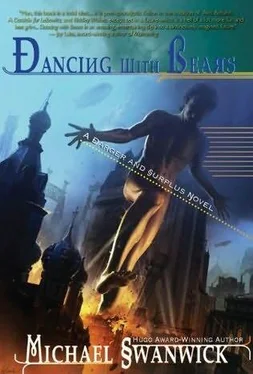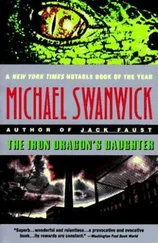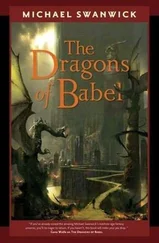Michael Swanwick - Dancing with Bears
Здесь есть возможность читать онлайн «Michael Swanwick - Dancing with Bears» весь текст электронной книги совершенно бесплатно (целиком полную версию без сокращений). В некоторых случаях можно слушать аудио, скачать через торрент в формате fb2 и присутствует краткое содержание. Жанр: Фантастика и фэнтези, на английском языке. Описание произведения, (предисловие) а так же отзывы посетителей доступны на портале библиотеки ЛибКат.
- Название:Dancing with Bears
- Автор:
- Жанр:
- Год:неизвестен
- ISBN:нет данных
- Рейтинг книги:5 / 5. Голосов: 1
-
Избранное:Добавить в избранное
- Отзывы:
-
Ваша оценка:
- 100
- 1
- 2
- 3
- 4
- 5
Dancing with Bears: краткое содержание, описание и аннотация
Предлагаем к чтению аннотацию, описание, краткое содержание или предисловие (зависит от того, что написал сам автор книги «Dancing with Bears»). Если вы не нашли необходимую информацию о книге — напишите в комментариях, мы постараемся отыскать её.
Dancing with Bears — читать онлайн бесплатно полную книгу (весь текст) целиком
Ниже представлен текст книги, разбитый по страницам. Система сохранения места последней прочитанной страницы, позволяет с удобством читать онлайн бесплатно книгу «Dancing with Bears», без необходимости каждый раз заново искать на чём Вы остановились. Поставьте закладку, и сможете в любой момент перейти на страницу, на которой закончили чтение.
Интервал:
Закладка:
So he stood apart from the others, listening to the silence. Lubyanskaya ploschad’ was lined with commercial businesses and prisons, which meant that however festive the rest of Moscow might be, this area was utterly dead. Not a single pedestrian disturbed the stillness. The night was cold and the city felt wrong to him.
Yevgeny shivered, and wished that Arkady were here with him. It was going to be a long, long night and, knowing what was going on in every bedroom in Moscow, he was absolutely certain it was going to be a lonely one.
But not a quarter-hour later, he was astonished when three dark figures rode into the square on horseback: General Magdalena Zvyozdny-Gorodoka with her famous red hair, Baron Lukoil-Gazprom, and a woman muffled head-to-foot in winter clothes who had the absolute best posture Yevgeny had ever seen.
“Lieutenant Tupelov-Uralmash,” the general said when salutes had been exchanged. “On duty and looking alert, as usual, I see.”
“I’m damnably glad somebody is,” the baron said. “Nine-tenths of our artillery is-”
“Hush. The condition of the army is my business, just as the condition of Gun Three is the lieutenant’s.” The general had been scanning Yevgeny’s crew. Now a quizzical tone entered her voice. “Do you have a mixed team, Lieutenant?”
Yevgeny, who well understood why gun crews were normally single-gender, blushed. “Two of my men were under the weather, ma’am. So I had to improvise.”
The general nodded solemnly. “While normally I frown upon improvisation, tonight is not a normal time. You are encouraged to maintain that same flexibility when the troubles start. In the meantime, keep a sharp eye out.” She wheeled her horse about, and said to the baron, “Now let’s see what else remains of our forces.”
“Precious little, I’m guessing,” the baron grumbled. “But, ma’am!” Yevgeny cried. “Sir! Exactly what are we looking for?”
“I have no idea,” the general said over her shoulder.
“Nor do I,” the baron said. “But this I guarantee: Whatever it is, you’ll know it when you see it.”
The unidentified woman studied Yevgeny solemnly and, soldier though he was, he found himself trembling in atavistic fear. It was like stepping into a jungle clearing and suddenly being confronted by a tiger. Then she flicked the reins of her horse and was gone, after her illustrious compeers.
Arkady returned to the New Metropol in a state of dejection. The last dozen places he had gone to, he had been turned away. The masters and mistresses of the house were engaged, he was told, and from the sighs and laughter he heard from the interior, he was certain this was so. There were signs also that the servants had scavenged the leavings of their masters’ drugs and would themselves soon be similarly engaged. Everybody, it seemed, was enjoying the fun but he.
He found the three stranniks sitting happily in oxblood-red leather armchairs, facing a small table on which flickered three candles. They were drinking glasses of hot tea and discussing theology.
“There,” said Chernobog, “is a perfect model for the triune nature of the Divine. Each flame is separate, but when we push the candles together-” all three stranniks leaned forward to do so-“their flames merge into one, intermingled and indivisible, and yet after all, still three flames for all of that.”
Svarozic reverently stroked the triune flame with his forefinger, and then kissed the new blister that arose on its tip.
“Your metaphor is comprehensible,” said Koschei, “and therefore it is not ineffable, and therefore it does not describe God. If one were to say that the flame comprises spirit and essence and being, one would come closer to the truth, for the mind can intuit that the words contain some meaning, but not what that meaning might be. Such is the majesty of the One, and the simplicity of the Three.” Then, without looking away from the flame, “Are your errands run, Arkady? Then come join us.”
There were no empty chairs in the room, so Arkady crouched on the floor by Koschei’s feet, like a dog. He joined the others in staring into the conjoined candle flame. He was not sure whether or not it was still supposed to represent God, nor what thoughts it was supposed to engender in him. He waited, but apparently the stranniks had said all they felt was necessary and were contemplating the ramifications of their wisdom. Finally, as in a trance, he heard his own voice break the silence, asking the question that had been much bothering him of late:
“Holy pilgrim, exactly what is the Eschaton? You have explained it to me, but not in terms I can understand.”
“You ask a difficult question, my young acolyte, and thus a worthy one.” Koschei rubbed Arkady’s head familiarly. “How best to put it? Ah! There is an ancient theory of ontology called ‘relativity.’ This wisdom I learned from the mad souls and spirits of rage who dwell within the tangled metal webs and nets of the underworld.”
“You took spiritual lessons from demons?”
“Demons cannot create-only God has that power. Similarly, they cannot lie.”
“They cannot even lie to themselves,” Chernobog added. “In this way, they show how inhuman they are. But they can put an evil interpretation on the truth. An apple is always an apple. But to Satan, it was created not for nourishment but as a temptation to draw Eve to sin. They cannot deny that sex is pleasurable. So they say that pleasure is evil. And so on.”
Koschei nodded. “Knowing this, a wise man can find wisdom even in the mouths of demons. One must only subtract their interpretation. So: According to the ancients, God is omnipresent and eternal. His omnipresence we call space and his endurance time, and this space-time we call the universe. Now, the universe is made up entirely of energy and matter. Seemingly, these are two separate things, but in truth each is an aspect of the other. If you were to speed up matter so that it went as fast as the speed of light, it would turn into energy.”
“You mean like an explosion?”
“Oh yes, there would be an explosion, greater than anything known to the current age. But that would be the least of it. Matter, being fallen, aspires to the higher state of energy. It wants to shed its gross state and become pure spirit.”
“The stars are all in the process of becoming spirit,” Chernobog amplified. “Some are so far distant that nothing of them remains but their light, spreading forever throughout the universe, and these we call angels.”
Svarozic mimed applause.
“As matter accelerates, however, time slows down for it, and its mass increases. The more mass it has, the more energy required to accelerate it. Thus, as matter approaches the speed of light, the energy required to bring it to that happy point where physicality is left behind and a soul may enter Heaven is infinite. And where is the only possible source of infinite energy?”
All three stranniks looked at Arkady expectantly. In the tiniest of voices, he said, “God?”
“Exactly. Tomorrow, the least fraction of the Divine will touch the city and all within its light will be transformed into pure spirit. Like…” Koschei looked around. “I need a sheet of paper.”
Svarozic drew a pocket missal from his robes and, opening it at random, tore out a page.
Koschei accepted the page and held it horizontally before him. “Imagine this sheet of paper is Moscow. Imagine that the candle-flame represents God. It does not, of course, but pretend. Tomorrow, the two will touch. Like so.” Delicately, he lowered the paper over the candle. A brown spot appeared in its center. Then it went up in flame. “You see?”
Arkady blinked. “You cannot mean this literally.”
“Yes, quite literally. Oh, to the sinful, there will be a worldly, rational explanation. Because God is forever lying to us, in order to test our faith. He creates fossils, for example, to tempt us to fall into the heresy of evolution. He creates injustice, so that we will doubt that everything turns out for the best. He kills off loved ones, so that we might fall into the error of mourning their loss. So to the secularists, it will look like a great fire is consuming the city. There will be a rational explanation-perhaps a cow will kick over a lantern, or a reformer will attempt to force the government to build new housing for the poor by torching the slums. There is an army forming up beneath the city which will emerge sometime tonight, and perhaps that will be the ostensible cause. But those who know will recognize it as the work of God.”
Читать дальшеИнтервал:
Закладка:
Похожие книги на «Dancing with Bears»
Представляем Вашему вниманию похожие книги на «Dancing with Bears» списком для выбора. Мы отобрали схожую по названию и смыслу литературу в надежде предоставить читателям больше вариантов отыскать новые, интересные, ещё непрочитанные произведения.
Обсуждение, отзывы о книге «Dancing with Bears» и просто собственные мнения читателей. Оставьте ваши комментарии, напишите, что Вы думаете о произведении, его смысле или главных героях. Укажите что конкретно понравилось, а что нет, и почему Вы так считаете.






